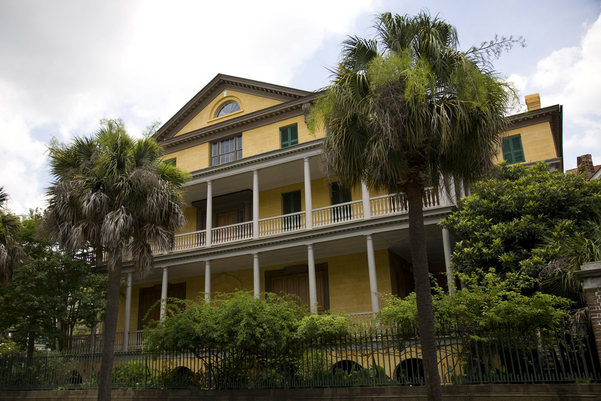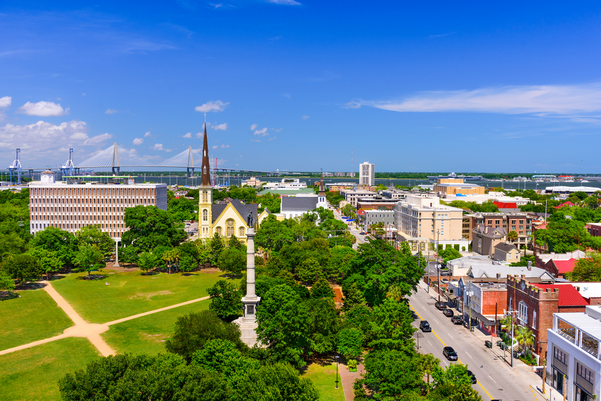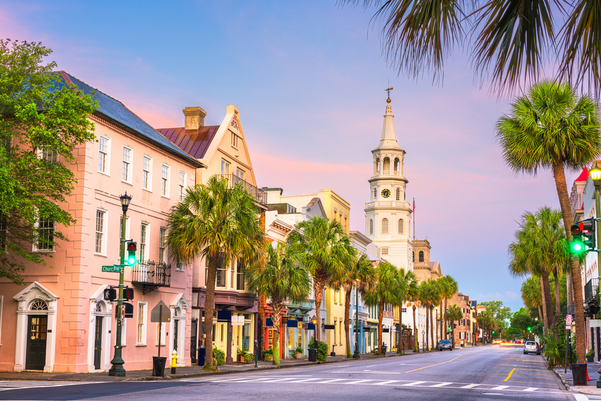- Introduction to Charleston’s Unique Architecture
- Utilizing Charleston’s Unique Architecture for Luxury Events
- Top Architecturally Significant Venues in Charleston
- How to Incorporate Charleston’s Architecture into Event Design
- Navigating Logistics for Events in Architecturally Significant Venues
- Conclusion: The Charm of Charleston for Luxury Events
- FAQs
Nestled on the coast of South Carolina, Charleston is a city where history breathes through every brick and beam, cobblestone streets tell tales of bygone eras, and modernity gracefully interweaves with timeless charm. Such an ambiance doesn’t just promise an event; it promises an experience enriched with elegance, grandeur and a touch of the past.
Introduction to Charleston’s Unique Architecture
Charleston, often referred to as the crown jewel of the South Carolina coast, stands as a testament to architectural evolution. It offers more than just picturesque landscapes and coastal allure. Its rich architectural tapestry vividly reflects a harmonious blend of its storied past and vibrant present.
This mosaic of styles, from Colonial grace to Art Deco flair, doesn’t just form the city’s backdrop—it becomes the stage itself. Recognizing the role of this architectural treasure trove in luxury event planning is the key to unlocking an unparalleled ambiance. By tapping into Charleston’s structural essence, event planners can transform any occasion into a living, breathing masterpiece that lingers in memories long after the last guest departs.
A Brief History of Charleston Architecture
Nestled on the coast of South Carolina, Charleston has been the heartbeat of American Southern culture for centuries. The city, founded in 1670, quickly grew to prominence due to its port and the rich agricultural offerings of its hinterlands. With the prosperity that commerce brought came the desire for ostentatious displays of wealth and status, which materialized in grand architectural marvels.
Over the centuries, Charleston weathered wars, earthquakes, and fires, but its architectural spirit remained unbroken. While some cities might’ve been reduced to rubble under such pressures, Charleston emerged stronger, with a distinct patchwork of architectural styles reflecting its rich history and resilience.
Architectural Styles Dominating Charleston
As the provided source mentions, over 2,500 historic buildings in Charleston showcase eight unique architectural styles: Colonial, Georgian, Federal, Classical Revival, Gothic Revival, Italianate, Victorian, and Art Deco. Each style speaks to a different era of Charleston’s history, visually narrating its journey through time.
- Colonial: The earliest structures, characterized by their simplicity and practicality, reflect the settlers’ English roots.
- Georgian: Symmetrical designs and brick facades reminiscent of the burgeoning affluence of early America.
- Federal: Post-revolutionary style, marked by its large windows and curved lines, representing the new nation’s optimism.
- Classical Revival: Drawing inspiration from ancient Greek and Roman designs, it emphasizes grand columns and intricate details.
- Gothic Revival: Characterized by pointed arches and elaborate tracery, it speaks to a turn towards European influences.
- Italianate: Flat roofs and wide eaves, with romantic and picturesque motifs, capturing the American admiration for European culture.
- Victorian: A style reflecting the technological advancements and eclectic tastes of the late 19th century.
- Art Deco: A modernist style that emerged in the early 20th century, emphasizing geometric forms and ornate details.
Utilizing Charleston’s Unique Architecture for Luxury Events
For those in the know, architecture is not just a backdrop—it’s a star player in the production of any event, especially luxury ones. In Charleston, the rich tapestry of architectural styles presents a plethora of options to choose from.
Why Charleston’s Architecture Lends Itself to Luxury Events
What makes Charleston unique? The answer goes beyond its beaches and famed Southern hospitality. The real essence of Charleston’s appeal lies in its beautifully preserved architecture and cobblestone streets that exude an air of timelessness.
For luxury event planners, Charleston’s buildings offer venues and characters. Imagine hosting an elegant garden party in a Georgian mansion or a sophisticated rooftop soirée atop an Art Deco building with panoramic city views. The architectural uniqueness of Charleston turns any event into a story, giving it a depth that few other cities can match.
The Role of Architecture in Creating a Luxurious Atmosphere
Charleston’s buildings aren’t just aesthetically pleasing; they play an instrumental role in creating ambiance. The grandeur of a Classical Revival mansion, with its towering columns and expansive lawns, instantly elevates the stature of any event held within its walls. The intricate details of a Gothic Revival building can add layers of sophistication to any gathering.
Event planners can leverage Charleston’s architecture to create a luxurious atmosphere even before any other element is added by choosing a venue that aligns with the desired mood and theme.
As we delve deeper into specific venues and how to incorporate Charleston’s architectural nuances into event design, it becomes clear that this city, with its historical charm and modern sensibilities, offers unparalleled opportunities for luxury events.
Top Architecturally Significant Venues in Charleston
Charleston’s architecture isn’t just for admiring; its buildings invite you in, offering venues that breathe life into every event. From historic mansions that have stood the test of time to boutique hotels that meld old-world charm with modern luxury, there’s a venue for every occasion.
Historic Mansions and Estates

There’s nothing quite as grand as hosting an event in a historic mansion. Think sprawling lawns, high ceilings, opulent chandeliers, and centuries-old charm. Historic mansions and estates, once the residences of Charleston’s elite, provide a backdrop that exudes luxury.
One notable example is the Aiken-Rhett House, a preserved antebellum mansion that offers a rare glimpse into 19th-century Southern life. With expansive grounds and rooms that transport you back, events here take on a nostalgic yet sophisticated aura.
Downtown Charleston Boutique Hotels
While Charleston boasts many luxurious hotels, its boutique offerings are unique. These establishments often reside in historic buildings but are reimagined with modern amenities and designs. They perfectly encapsulate Charleston’s blend of history and contemporary flair.

Take, for instance, The Dewberry. Located in a mid-century building, this hotel is a beautiful example of how vintage can meet contemporary. Its lavish ballroom, with floor-to-ceiling windows offering views of historic Marion Square, can turn any event into a spectacle.
Unique Event Spaces in Restored Buildings
Beyond traditional venues, Charleston offers a variety of unique event spaces in restored buildings. Warehouses turned art galleries, former churches reborn as event halls, or old barns transformed into dining venues – these spaces provide a distinctive charm and an intriguing story.
The Cigar Factory, for instance, is a testament to Charleston’s adaptive spirit. Once an industrial hub, it now serves as a versatile event space, merging raw, industrial aesthetics with chic, modern touches.
How to Incorporate Charleston’s Architecture into Event Design
Selecting a venue is just the first step. To truly make an event memorable, one must weave the architectural essence of Charleston into every element of the event design.
Transforming Historic Spaces for Contemporary Events
Historic venues come with their own set of challenges. While undeniably charming, they might only sometimes align with contemporary design aesthetics. The key lies in blending the old with the new without compromising the integrity of the space.
Modern lighting techniques, for example, can highlight a building’s classic features. Minimalistic décor can contrast beautifully with intricate architectural details, drawing attention without overwhelming. It’s about enhancing what’s already there, not overshadowing it.
Bringing the Outside In Translating Architectural Themes in Indoor Settings
Charleston’s architecture isn’t just about buildings. The city’s streets, squares, and gardens are just as much a part of its charm. Bringing elements of this outdoors inside can create a seamless transition between the venue and its surroundings.
For instance, consider using plant arrangements that mirror the estate gardens if hosting an event in a Georgian building. If in an Art Deco space, geometric patterns in the décor can echo the building’s design. This cohesion ensures the event feels like a natural extension of the venue.
Navigating Logistics for Events in Architecturally Significant Venues
With grandeur comes responsibility. Hosting events in historic or significant venues isn’t just about aesthetics; it’s about respecting the space and ensuring everything goes off without a hitch.
Understanding Local Permits and Regulations
Charleston’s rich history means stringent regulations are in place to protect its architectural gems. Before planning an event, it’s imperative to understand local permits. Some venues might have restrictions on sound levels, décor modifications, or even guest count. It’s always advisable to liaise with local authorities or consult experts well in advance.
Working with Venue Management
Communication is crucial. Venue management teams are guardians of these architectural treasures. Collaborate closely with them to ensure your event aligns with their guidelines. They can offer insights into maximizing the venue’s potential while preserving its essence.
As you continue to curate the perfect luxury event in Charleston, remember it’s a city where the past and present coexist harmoniously. You can craft a timeless and contemporary event by understanding, respecting, and creatively utilizing its architectural wonders.
Conclusion: The Charm of Charleston for Luxury Events
As the curtains close on our architectural journey through Charleston, it becomes evident that this city is not just a location but a living, breathing character ready to play a pivotal role in the narrative of any luxury event. With its deep-rooted history and the ever-evolving present, Charleston provides a canvas for creating unforgettable experiences.
How Charleston’s Architecture Elevates Events
Charleston’s architectural diversity is its strength. From the romantic whispers of cobblestone streets to the authoritative stance of historic mansions, every corner of this city tells a story. Incorporating these narratives into luxury events adds depth and sophistication that’s hard to replicate elsewhere.
Imagine a wedding reception in a Victorian-style mansion, where every ornate detail tells tales of love from past eras. Or a corporate gala in a restored warehouse, showcasing innovation amidst history. The versatility of Charleston’s venues means they can be molded to fit any vision, making each event a masterpiece in its own right.
Future Trends: Sustainable and Historical Events in Charleston
The world is evolving, and so are event trends. The rise of sustainability and a growing appreciation for authenticity means future events in Charleston are set to merge the city’s historical essence with eco-conscious choices. Whether sourcing local produce for a lavish feast, using upcycled décor, or ensuring minimal waste, Charleston’s luxury events will reflect a blend of opulence and responsibility.
Moreover, there’s a growing trend towards experiences that tell a story. Event organizers are leaning into Charleston’s rich history, crafting events that aren’t just visually stunning but deeply rooted in the city’s past. Historical tours, reenactments, and thematic possibilities that pay homage to different eras are becoming increasingly popular.
FAQs
What type of architecture is Charleston known for?
Charleston boasts over 2,500 historical buildings, reflecting eight distinct architectural styles: Colonial, Georgian, Federal, Classical Revival, Gothic Revival, Italianate, Victorian, and Art Deco. Each style is a testament to a specific period in Charleston’s rich history.
What makes Charleston unique?
Charleston’s allure lies in its fusion of Southern charm, historic landmarks, pristine beaches, and exquisite cuisine. Its well-preserved architecture, iconic cobblestone streets, and vibrant arts and culture scene further amplify its global appeal, making it a favorite among tourists and event planners.
Are there any restrictions when hosting events in historical venues in Charleston?
Due to the historical significance of many Charleston buildings, strict regulations are often in place to preserve their integrity. It’s essential to liaise with venue management and understand local permits and regulations before planning an event.
How can one blend modern event design with Charleston’s historic venues?
The key lies in striking a balance. Use modern lighting to accentuate classic features, opt for minimalistic décor to highlight intricate architectural details, and draw inspiration from the venue’s surroundings to bring a cohesive feel to the event space.
In essence, Charleston’s architecture is not just bricks and mortar. It’s a storyteller, a time capsule, and a testament to the city’s enduring spirit. This architectural brilliance can transform any luxury event into a memorable affair.
Which are the best seasons to host an event in Charleston to truly appreciate its architecture?
Charleston’s temperate climate makes it a year-round destination. However, to truly immerse in its grandeur, many opt for the spring (March-May) when historic gardens bloom, complementing the city’s architectural beauty. Fall (September-November) is another favorite, offering pleasant weather and a canvas of autumnal colors that accentuate the historic buildings’ charm. While summers can be humid and winters cooler, the city’s architectural marvels remain constant, ensuring a stunning backdrop regardless of the season.

